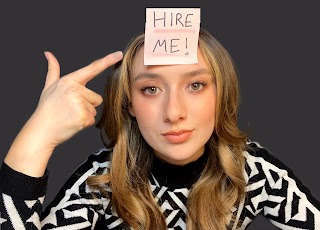How to Get Work Experience (/Beg for a Job) in Film & TV
Hi everyone,
As well as running this blog, I work full-time in the film & TV industry, and I’m currently working on a big budget feature film. I get messages on LinkedIn and Instagram all the time from new entrants asking for advice on how to get started (which I welcome and will always reply to, just Insta-DM me @BelfastMediaGirl)
Given the amount of people who helped me out when I was at square 1, I feel like least I can do is pay the good deed forward.
Following on from my last blog, ‘5 Steps to Getting your Foot in the Door,’ I thought it would be useful to write up another guide on how to ask for work experience in the film & TV sector.
1. Make a List
Start by researching NI-based TV companies, Google will show you a few, but I recommend checking out NI Screen’s socials, and writing down all of the companies they mention in their posts.
NI Screen | @NIScreen |
NI Screen will mention way more active indies (independent production companies) than Google will show on their first page (which I’m pretty sure only shows BBC, UTV and the studios)
Once you have a list of 10-15 companies, (trust me, there are definitely 10-15, if you haven’t found 10, you’re not researching hard enough) it’s time to move on to Step 2!
2. Finding Contact Details (Without Being Creepy!)
Once you have your list, you should check out the companies’ websites, most of which, will have a ‘People’ and an ‘Our Shows’ or ‘Our Work’ section.
Have a look in the ‘People’ section to see who’s working there, and what their jobs are. Now, you can use a little common sense to figure out who it is that you should be trying to reach out to.
Some companies include the work email addresses in each person’s profile in the ‘People’ section, so you can reach out to them directly, which is way better then contacting the company’s generic ‘info@__.org.uk’ address.
If the website doesn’t have individual email addresses visible, it’s still super useful to see who works there, and what their jobs/titles are.
I really recommend trying to find the relevant person’s contact details, and if they aren’t available on the company website, a little google search couldn’t hurt. Their email address may be available online elsewhere e.g., on their personal website/twitter/blog/CV they may have made public.
Another good way to find a contact, is if you try to add them on LinkedIn, you’d be surprised by how many people would be willing to add you back! I had Snapchat’s Head of Content Creation on LinkedIn for a while because I had my boss ask me to find an email address for them.
Once someone’s accepted your LinkedIn request, if they have their contact info available on their profile, it should then become viewable!
3. Research
Now that you have an idea of who you’d like to speak to and how to contact them, you NEED to do some research into what they’ve worked on, and what their company’s done before you reach out to them.
Remember that ‘our shows’ or ‘our work’ section on the website I mentioned earlier? This is the first place you should be checking out to see what shows their company has on their slate.
If you haven’t already seen at least 1 of them, watch a few episodes of a couple of their shows. You want to be able to say you’re a fan of their work, and not get caught out when they ask what you liked about it, don’t make a liar out of yourself!
Also be sure to check out the company’s social media platforms to see if there’re any new awards they’ve picked up or new programme/commission announcements that you could mention when reaching out to them.
I know this is more work than just writing one generic ‘I’m a student/new entrant, here’s my CV, please give me work experience’ email and copying and pasting it to everyone on your list, and there’s a reason I’m not telling you to do that.
Trust me, successful people in the Film & TV sector (including me now) get these kinds of emails all the time, and they can spot a copy+paste job a mile off. It also looks super lazy and makes a bad first impression.
Taking 10 minutes to get a direct email address and researching the person/company before you reach out to somebody looking a favour, really goes a long way when compared to the amount of uninformed, generic emails the company’s ‘info@’ inbox is full of.
4. Tips for Writing the Email
Now that you’ve done your research and are writing out the email, make sure you attach an updated CV, and say in the email that they have your permission to keep your CV/details on file should anything come up (due to data protection laws, they legally can’t hold onto it without your permission, so give it before you’re asked!)
Mention the shows they did that you like, and be sure to tailor your favourite shows to match what the company do i.e., don’t email a factual entertainment company talking about how much you love Game of Thrones and Line of Duty, you’ll get a lot further by mentioning the Fact Ent shows you like first.
If you reach out to a company all bizz about another genre, they’ll wonder why you’re contacting them, instead of somewhere that makes the genre you’re talking about.
As much as I love ‘Thrones and Line of Duty (and you’re obviously allowed to consume and enjoy more than 1 genre), when I was applying for the Stellify Media summer internship, I made sure to talk about the factual entertainment shows I liked. I genuinely loved their shows Beauty Queen & Single and In Solitary, so I made sure I mentioned that!
If I was applying for their internship this year, I’d be sure to mention how cool and exciting it is that they’re moving into scripted work (see what 2 minutes of research can do to boost your application/email?) and that I’d love to be part of that
(Applications for it are still open by the way, click here for the application, and this is the one time you DO send to info@stellifymedia.com alongside your CV, don't say I don't do anything for yas 😘)
Also ask at the end of the email, if a placement is not possible (which sadly, due to COVID issues, may be the case) is there any chance they might be willing to chat to you for 15 minutes over a Zoom coffee (or in real life, when allowed) because you’d love the opportunity to chat and pick their brain about their career.
5. Follow Up
People in Film & TV are really busy, so if you reach out to them and don’t hear back, it’s probably just because they’ve forgotten.
It’s also safe to assume they get emails from new entrants asking for work experience all the time, anyone can write an email once and send it off, the ones who actually get the placements are the ones who follow up.
I recommend following up by email and also over the phone, you’d be surprised by how many people send 1 or 2 emails and give up. You’ll be amazed at the difference going even slightly above the bare minimum can make.
So, make sure you follow up with a phone call and utilise the wonder that is ‘pester-power,’ because I’ve found that they’re more likely to get back to you once you make them realise that you aren’t going to go away. Don’t be afraid to be incredibly keen (I’m the CEO of this 😂) and enthusiastic, the start of your career is not the time to play it cool.
If it’s been more than a month or 2 and you haven’t heard back, it’s time to stop wasting your energy, and focus on another contact/company on your list.
If you get to the bottom of your list without any success, you can either do some more research to find 10 more companies, or go back to the top of it again!
6. Consistency in the Face of Rejection
Everyone in the Film, TV & Media Industry faces rejection, especially at the beginning of their careers. I know it can be disheartening but the only way to get used to it is to keep going, and trust that it’s part of the process.
I’m finally at a point in my career where rejection’s like water off a duck’s back, and when my current job ends in September and I’m back out looking for work again, I’m confident that if I keep working, applying and reaching to people that the phone will ring again.
Remember that you haven’t failed until you stop trying, and that persevering, enthusiasm, hard work (and being just a little bit ballsy) is key.
Stacey 💕✨☕️💡


an excellent piece of advise for anyone wanting to get into the industry. I've been in the industry as a hairdresser, wig specialist & make up artist for over 20 years and I commend you for wanting to help new entrants and also sharing this advice I share your enthusiasm in wanting to help new entrants in any way I can.
ReplyDeleteThank you so much for the lovely comment! It really means so much to me that other industry professionals are reading it! 💕
Delete